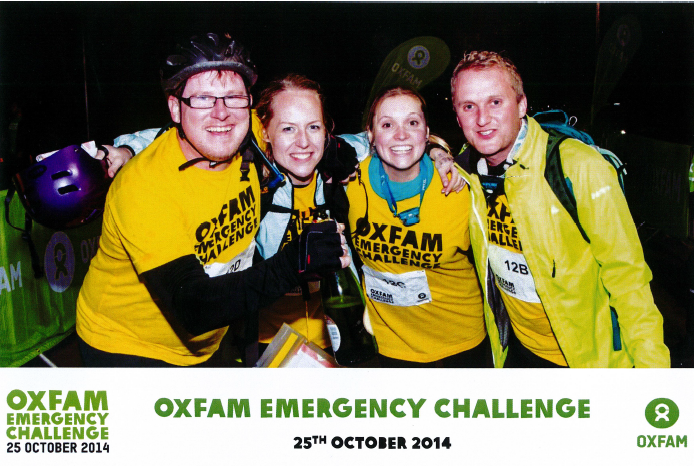‘Anyone up for taking part in Oxfam Emergency Challenge?’ My email said. Great cause, excitement and team effort were the words I was reading in the question. It was sunny afternoon, I was sitting at my desk and the idea of a day spent in the countryside could not have seemed more appealing. I am game. I gave the obvious answer and joined Chris, Ed, Emily, Florian, Mel, Sarah and Andreas in the adventure. To be more precise, 12 hours of body-sapping, brain-draining adventure to support Oxfam and its emergency response efforts.
Oxfam is best known for helping people in a crisis. Afghanistan, Haiti, Sierra Leone – Oxfam teams are saving lives around the world, and with the number of Ebola cases rapidly rising, I was proud to be supporting an organisation standing at the forefront of efforts to prevent the spread of the disease.
Our fundraising target was £2,000. Enough to secure clean drinking water, sanitation, medical care or shelter for hundreds of people in need. We put on a weeks’ long bake-off, organised a game of rounders, put on a quiz and bombarded our friends and family with information about Oxfam’s work to gain more support. In between organising fundraisers, we were running, cycling and orienteering in nearby parks. Bursting with impatience, we packed our head torches and put on waterproofs. We were ready.
An early wake-up call and last minute strategizing was only the beginning. Impressed by the beauty of the Wellington College, we made our way into the post-disaster zone. When we collected our t-shirts and found mountain bikes, we set down around pre-arranged tables and slowly started to gather what was to come.
Typhoon Ruby just hit the coasts of ‘Oxtania’. Split into pairs, and with no phones or GPS, we made our way through the fields mapping the situation and collecting facts to report back. We then spent over an hour negotiating with other organisations (teams) to purchase adequate supplies and services. This was before we found ourselves back in the field. There, we designed, assembled and operated a construction capable of delivering water form one shore to another. After a few hours of tying knots and pouring water from swinging buckets, we were back on our feet collecting supplies and delivering them to emergency camps. It was pitch dark when the last load was dropped off and we made our way through the finish line. Helmets in one hand, a bottle of bubbly in the other, the pressure was off. We had done it.
I realised that while I thought I knew what emergency responses entail, I had actually very little idea about the challenges staff of Oxfam, and other organisations, face on the ground. Being able to assess complex situations, communicate findings, coordinate help, multi-task, improvise and work under pressure, though crucially important, are only a few of many skills and strengths required by post-disaster emergency teams. We worked hard, placed well and enjoyed every minute of anticipating what was to come. However, and most importantly, we learnt about the significance of emergency response and the difference every pound spent makes to people’s lives. You can donate to Oxfam’s current emergency responses by visiting our Just Giving page.


